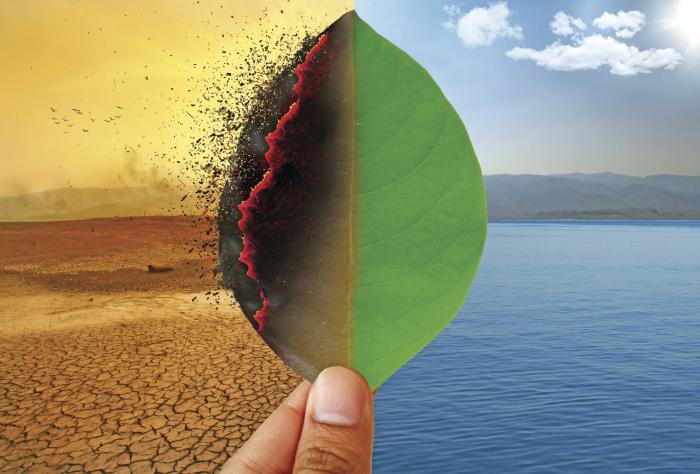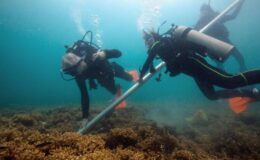APR. 6th- National Climate Change Awareness Day
- By : James Bryson
- Category : Environmental

https://www.laestrella.com.pa/cafe-estrella/planeta/220302/analisis-emergencia-cambio-climatico
Starting with this first installment, we will bring to the ‘Planet’ section the knowledge and analysis of scientists and professionals from the social and political sciences to explore the current climatic emergency, of unprecedented dimensions that makes us the last generation that will be able to save millions of living beings product of 3,500 million years of evolution.
Projections from recent high-level documents, including those of the Intergovernmental Panel on Climate Change, indicate that future environmental conditions will seriously affect food production, water availability, health, security, and social peace.
We are living through the greatest emergency humanity has ever faced. Everything we love is at stake. Absolutely everything. We are not referring to the covid pandemic or the Russian invasion of Ukraine, both terrible. We are talking about the climatic-ecological emergency that we have unleashed and that is plaguing us.
Projections from several recent high-level documents, including those of the Intergovernmental Panel on Climate Change (IPCC), indicate that future environmental conditions will seriously affect food production, water availability, health, safety and security. social peace, increasing the intensity and frequency of extreme weather events even more. The climate emergency directly impacts the integrity and functionality of all the planet’s ecosystems, which are the basis of all our activities and allow our survival.
German climatologist Hans Joachim Schellnhuber, founding director of the Potsdam Institute for Climate Impact Research and former chairman of the German Advisory Council on Global Change, puts it this way: “There is a very big risk that we will end our civilization. The human species will somehow survive, but we will destroy almost everything we have built over the last two thousand years. We are putting our children on a school bus that with a 98% chance will end in a fatal accident.”
To understand the effects and consequences of global warming, we must take into account the geophysical systems that control the climate. They are complex systems capable of absorbing changes up to a certain limit, above which increasingly larger fluctuations are produced until finally reaching points of no return, where abrupt and irreversible changes occur. According to recent studies we are very close to or entering the threshold of those points of no return.
The Paris Agreement, which was adopted in 2015 at the Conference of the Parties 21 or COP21 (where the nations of the planet converge to seek solutions to climate change), aims to limit the increase in the planet’s temperature to 1.5 degrees Celsius ( °C) relative to pre-industrial temperatures (circa 1875). It might seem like a minor increase; however, each additional small increment of warming will cause more damage, more loss of life, and a greater chance of passing the points of no return. Any rise above 1.5°C would be disastrous.
heat waves
Deaths related to heat waves have increased by 54% in the last two decades, reaching 296,000 in 2018. In 2019 alone, 380 billion work hours were lost due to excessive temperatures, compared to 580 billion due to covid in 2020. Currently we have already reached an average increase of 1.2 °C and it is expected that at the current rate we will reach 1.5 °C between 2030 and 2035. Due to the lack of emission reductions, many scientists (including IPCC scientists) consider that the 1.5°C goal is no longer attainable. At the current rate of emissions, the planet will exceed 2°C between 2040 and 2050.
These numbers will translate into unimaginable human tragedies that will affect billions of people: famines, diseases, material losses, deaths, forced migration, conflicts, among others.
gas emissions
The IPCC report of August 2021 imposes a red code for humanity due to climate change and ensures that the window of action to avoid the worst effects is very narrow. The science of climate change is clear and the solutions are on the table. The only way to stop warming and avoid a catastrophe is to drastically reduce our emissions of greenhouse gases (GHG: CO2, CH4, N2O, fluorinated gases).
The IPCC says that cutting GHG emissions to 45% of the 2010 mark this decade is the only way to limit warming to below 1.5-2°C.
The climate approaches of the nations at COP26 and their nationally determined contributions have been nothing more than promises, since while 26 Conferences of the Parties have passed, the concentration of GHG has been increasing at an increasingly rapid rate, as well as the temperature.
The saddest part of the situation is its injustice: the per capita consumption of the richest 1% in the world represents 15% of global emissions, the richest 10% causes 48% of global emissions, while the 50% poor of humanity contributes only 7% of all emissions. In other words, in order not to exceed the limits of the Paris Agreement and save ourselves from the worst consequences, it will be necessary for the richest 1% in the world to cut their emissions by a factor of 30.
World leaders are not taking steps to prevent the destruction of life, probably because it is not in their interest for economic-political reasons. It is not necessary to go to activist circles to find frustration, despair and anger at it. Prominent figures in climate diplomacy reflect this reality in their speeches. The Secretary General of the United Nations, Antonio Guterres, declared on February 28, the date of publication of the latest IPCC report on impacts, adaptation and vulnerability, that: “The facts are undeniable, (that report) is an atlas of human suffering and climate failure to our leaders. This lack of leadership is criminal. The biggest polluters in the world are to blame for the arson of our only home.”
On the other hand, Panama’s chief negotiator at COP26, Juan Carlos Monterrey Gómez, acknowledged that it is not the negotiators at the COP or the political leaders, but the growing movements of climate activists who will take over the world’s capitals and entrepreneurs green who give hope to achieve the necessary transformations. The climate justice movement is made up of many diverse groups, and they are increasing in number, size, and geographic distribution.
Between next March and April various actions will be carried out for the climate. These are actions of civil disobedience, because governments no longer protect their citizens from existential dangers. States are financing the fossil fuel business with millionaire public subsidies, forcing their citizens to pay for their own destruction and that of millions of other forms of life.
But something unprecedented is happening: the Scientific Rebellion (SR). Renowned scientists are taking to the streets, acting accordingly. We are in an emergency, the greatest challenge humanity has ever faced, and the people who know the most about it are the best to lead by example.
Between April 4 and 9, under the slogan ‘1.5 °C has already failed, climate rebellion now!’, more than a thousand scientists will be carrying out massive and direct actions of non-violent civil disobedience, making strong personal sacrifices, risking dismissal and arrest because they no longer see another solution to communicate their despair and fear. But above all, to exert the necessary pressure so that the rulers do the right thing: initiate a comprehensive transformation of our society, from one based on the fallacy of infinite growth on a finite planet to one governed by planetary limits, the only way to exist in a sustainable way, because in the end, the planet does not care what we think or what we want, everything works according to geophysical laws and it is with them that we must be aligned.
In Panama, the movement ‘YA ES YA!’ demands climate justice and that the industrialized nations of the Global North drastically reduce their emissions, prioritizing life, not business.
The population has the right to know what is happening. The climate emergency must be at the center of the debate, just as covid was at the time. The country came together for a moment to fight against the common enemy that was the pandemic. This climate enemy is a million times bigger and more ferocious than the virus!
April 6 will be National Climate Change Awareness Day. We call on all educational centers, public schools, universities and other educational institutions to stop, putting the climate as the only content.
To private companies, public, private and faith institutions, unions, public officials, independent workers: let us all join the call for conversation and action on the climate.
For more information contact through: info@yaesya.org, baluuala@gmail.com, panamascientistr@gmail.com, scientistrebellion@protonmail.com or follow ‘YA ES YA’ and ‘Balu Uala’ on Facebook, Instagram and YouTube .
Dr. Renate Sponer is a biologist and director of the Balu Uala Foundation and a member of the collective ‘YA ES YA!’



No Comments